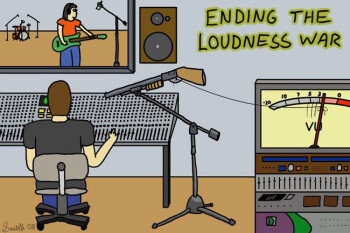This penultimate article in our series dedicated to mastering at home is surely the one you've all been waiting for. Indeed, today we will talk about a couple of tricks to get a really HUGE sound. But before we start, a brief warning...
Disclaimer
We have repeated it endlessly since we started with this series, but one last time won’t do any harm: Louder is not better! Everybody loses in the loudness war ─ you, your music and the people listening to it. The techniques we will mention below are not to be taken as magic tricks, but rather as weapons of mass destruction that you need to handle with as much care as possible. In order to avoid any misdeeds, always make A/B comparisons at the same perceived volume before and after any processing. You should be able to tell right away the damages, if any, and whether it is worthwhile..
The quest for a couple of dBs
The first trick we will address consists in applying two compression stages. First, insert your favorite compressor and use “soft” settings, meaning a low ratio (1.5:1), an attack time that is long enough to prevent the peaks from being caught by the compressor, and the threshold set so that you get 1 dB to 1.5 dB of gain reduction. This compressor will serve as sort of a “glue” for the mix, while at the same time gently reducing the dynamics, which will make the job of the second compressor easier. The latter can be set a bit more aggressively in order to get 2 dB to 3 dB of additional gain reduction without it being too detrimental.
The second technique is nothing more than a variation on the first one, but using limiters instead. You should set the thresholds of the limiters so that you get –1.5 dB to –2 dB on each of them, although you’ll get a more transparent result when you use one single limiter set to –3 dB or –4 dB. This will allow you to push the boundaries a bit further…
Another “recipe” to gain some SPL without sacrificing the transients is so-called “parallel compression.” To achieve that, send your mix to an aux bus where you will insert a compressor set beyond any sense of reason — the highest possible ratio, a super-fast attack to crush even the faintest sign of a transient and a threshold well below ground level. Now pull down the fader on that bus and then bring it up slowly until you reach the desired loudness. This sub-mix of the über-compressed bus with the original mix will allow you to pump the RMS level while preserving the natural peaks of the source material.
What’s more, you could always take the last technique a bit further by inserting an EQ after the compressor to aim at a specific frequency range with the parallel compression. Finally, nothing stops you from combining all the above tricks, but beware of the risks and perils it entails!


